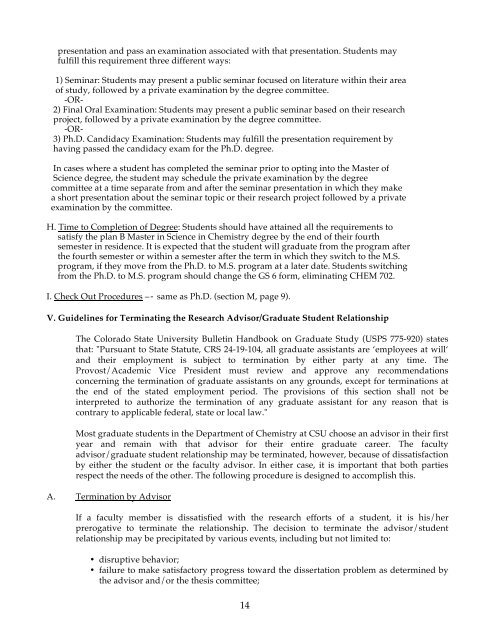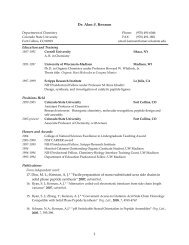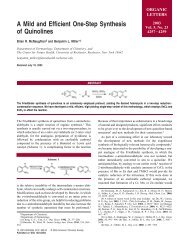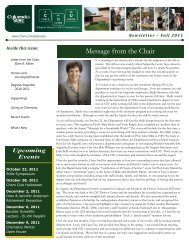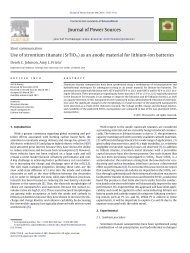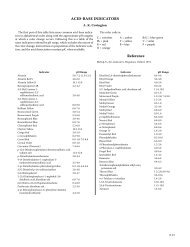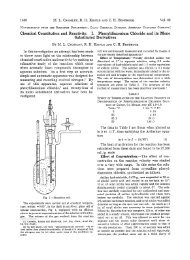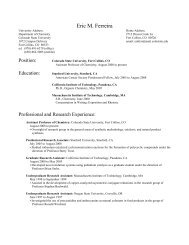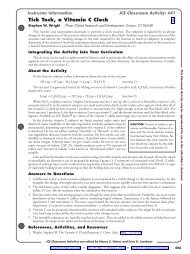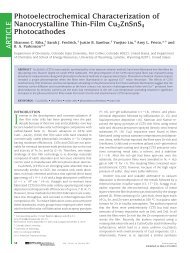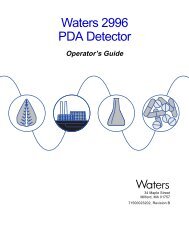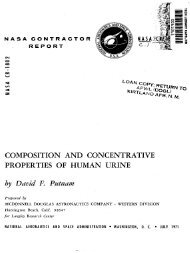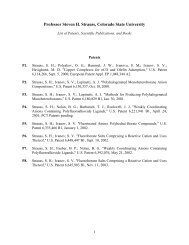The Green Book - Department of Chemistry - Colorado State University
The Green Book - Department of Chemistry - Colorado State University
The Green Book - Department of Chemistry - Colorado State University
- No tags were found...
Create successful ePaper yourself
Turn your PDF publications into a flip-book with our unique Google optimized e-Paper software.
presentation and pass an examination associated with that presentation. Students mayfulfill this requirement three different ways:1) Seminar: Students may present a public seminar focused on literature within their area<strong>of</strong> study, followed by a private examination by the degree committee.-OR-2) Final Oral Examination: Students may present a public seminar based on their researchproject, followed by a private examination by the degree committee.-OR-3) Ph.D. Candidacy Examination: Students may fulfill the presentation requirement byhaving passed the candidacy exam for the Ph.D. degree.In cases where a student has completed the seminar prior to opting into the Master <strong>of</strong>Science degree, the student may schedule the private examination by the degreecommittee at a time separate from and after the seminar presentation in which they makea short presentation about the seminar topic or their research project followed by a privateexamination by the committee.H. Time to Completion <strong>of</strong> Degree: Students should have attained all the requirements tosatisfy the plan B Master in Science in <strong>Chemistry</strong> degree by the end <strong>of</strong> their fourthsemester in residence. It is expected that the student will graduate from the program afterthe fourth semester or within a semester after the term in which they switch to the M.S.program, if they move from the Ph.D. to M.S. program at a later date. Students switchingfrom the Ph.D. to M.S. program should change the GS 6 form, eliminating CHEM 702.I. Check Out Procedures –‐ same as Ph.D. (section M, page 9).V. Guidelines for Terminating the Research Advisor/Graduate Student Relationship<strong>The</strong> <strong>Colorado</strong> <strong>State</strong> <strong>University</strong> Bulletin Handbook on Graduate Study (USPS 775-920) statesthat: "Pursuant to <strong>State</strong> Statute, CRS 24-19-104, all graduate assistants are ‘employees at will‘and their employment is subject to termination by either party at any time. <strong>The</strong>Provost/Academic Vice President must review and approve any recommendationsconcerning the termination <strong>of</strong> graduate assistants on any grounds, except for terminations atthe end <strong>of</strong> the stated employment period. <strong>The</strong> provisions <strong>of</strong> this section shall not beinterpreted to authorize the termination <strong>of</strong> any graduate assistant for any reason that iscontrary to applicable federal, state or local law."Most graduate students in the <strong>Department</strong> <strong>of</strong> <strong>Chemistry</strong> at CSU choose an advisor in their firstyear and remain with that advisor for their entire graduate career. <strong>The</strong> facultyadvisor/graduate student relationship may be terminated, however, because <strong>of</strong> dissatisfactionby either the student or the faculty advisor. In either case, it is important that both partiesrespect the needs <strong>of</strong> the other. <strong>The</strong> following procedure is designed to accomplish this.A. Termination by AdvisorIf a faculty member is dissatisfied with the research efforts <strong>of</strong> a student, it is his/herprerogative to terminate the relationship. <strong>The</strong> decision to terminate the advisor/studentrelationship may be precipitated by various events, including but not limited to:• disruptive behavior;• failure to make satisfactory progress toward the dissertation problem as determined bythe advisor and/or the thesis committee;14


